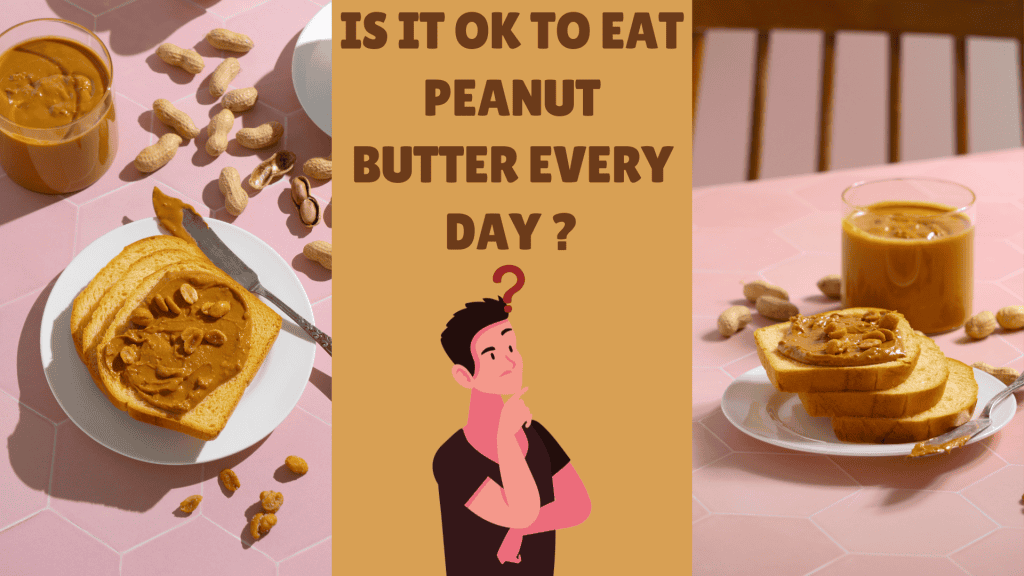Have you ever thought, Is it ok to eat peanut butter everyday? Many of us have asked this question while putting peanut butter on our toast in the morning or having homemade peanut butter cookies. For example, some people suffer from allergies to peanuts, and others might worry about the calories and fat in peanuts, but if you keep it moderate and balanced, eating peanut butter every day can fit into a healthy food chart. Eating not more than two tablespoons, or around 32 grams, per day to avoid exceeding your saturated fat consumption because commercial peanut butter brands add sugar, oil, and fats, which contributes to serious health concerns.
Peanut butter is not only a tasty snack but also full of nutrients that are suitable for health in many ways. So, what are the advantages of eating peanut butter every day? Well, to begin with, it is an excellent source of protein that gives your body the energy needed to get through the day. Also, peanut butter has healthy fats and essential vitamins and minerals that help keep you well overall, but, like any other food, there are things to consider. Knowing both the good things and possible wrong sides helps you decide smartly about adding peanut butter to your daily meals.
Can I eat Peanut butter every day?
Yes, you can eat peanut butter every day, but it is good to be alert and intelligent about it because it is a calorie-dense food, and pick up the best kind of peanut butter for your health. Around two tablespoons of daily peanut butter serving works fine for any moderately active man. Also, peanut butter is very rich in antioxidants like manganese, vitamin E, and resveratrol. These antioxidants fight against free radicals, the annoying molecules that can cause many problems such as cancer, heart disease, and aging skin, and vitamin E are like a protective shield for your skin against aging effects.
However, too much of every good thing can sometimes cause problems, like eating a lot of Peanut butter for weight gain, especially ones with lots of sugar or fat, which might make you gain weight more than you want. For people who have peanut allergies, it feels like balancing on the peak of the mountain because there is always the danger of having a severe allergic reaction.
How much peanut butter can I eat a day?
Many people think about this daily peanut butter nutrition treat, and the truth is that only about two tablespoons (32 grams) of peanut butter will benefit your health if eaten with care and in control. Only two tablespoons of peanut butter can provide 190 calories, 8 grams of protein, 16 grams of fat, 7 grams of carbohydrates, 3 grams of fiber, and 1 gram of sugar. Peanut butter is made from roasted peanuts and contains many nutrients like vitamins E, B3, and B6, as well as minerals such as magnesium and manganese. These essential nutrients do many good things for your body and give clarity about whether Is it ok to eat peanut butter everyday or not. These nutrients support your immune system, helping to keep nerves steady and providing a boost to metabolism.
However, Can I eat peanut butter every day becomes controversial because not all peanut kinds of butter are of the same type you find in stores that have hidden things like sugar, trans fats, and vegetable oils added to them. These extras may change your healthy peanut butter into a less good snack, causing troubles like gaining weight and heart problems. To avoid these issues, choosing natural or organic peanut butter types like keto peanut butter or homemade peanut butter without extra sugars or hydrogenated oils is wise. Additionally, peanuts are full of plant-based protein, which is suitable for vegetarians and vegans who need protein fixing. That way, you can enjoy all the benefits without any downsides.
Benefits of Eating Peanut Butter every day?
The benefits of Eating Peanut butter every day vary as peanut butter has a low glycemic index, which helps maintain the blood sugar level at a stable rate. It is packed with vitamins, minerals, and other antioxidants that prevent the cells from breaking down, like vitamin E and other phytochemicals. Proteins in peanut butter contain amino acid essentials that are useful in muscle development and repair after workouts or training sessions. Peanut butter might help a lot in reducing heart disease and diabetes risks, clarifying the common question: Is it safe to eat peanut butter everyday? How does it happen? Well, it’s entirely due to Oleic Acid, which is a particular type of fat present in olive oil and, yes, also, peanut butter.
Oleic acid moves quietly in your body to keep cholesterol levels balanced and makes the good cholesterol high and bad cholesterol low, which helps a lot for a healthy heart. Oleic acid also keeps blood sugar levels steady, which lowers the risk of type 2 diabetes. Also, remember that omega-6 fatty acids work alongside oleic acid. They come in to increase your good cholesterol and help reduce inflammation. Due to its versatility and convenience, whether Is it ok to eat peanut butter everyday becomes very clear as it could easily be incorporated into so many meals like a Protein diet plan or snacks with ease for a quick, nutritious energy source. Eating peanut butter every day can offer several health benefits when consumed in moderation as part of a balanced diet. Here are some of the key benefits mentioned below.
1. Nutrient-Rich
- Rich in Protein: Peanut butter has many plant-based proteins, which are among the best Protein rich foods and are essential for repairing and growing muscles.
- High in Good Fats: It has monounsaturated and polyunsaturated fats, which are suitable for heart health.
- Vitamins and Minerals: Peanut butter has essential nutrients like vitamin E, magnesium, potassium, and vitamin B6.
2. Heart Health
- Managing Cholesterol: Peanut butter’s good fats may help lower bad cholesterol (LDL) and boost good cholesterol (HDL).
- Blood Pressure: Peanut butter’s magnesium and potassium are suitable for keeping blood pressure regular and helping heart health.
3. Weight Management
- Satiety: Peanut butter’s protein and fiber can make you feel full, helping control hunger and lower the total number of calories you eat.
- Energy Boost: Peanut butter gives a constant energy supply, making it very good for eating before exercise.
4. Blood Sugar Control
- Low Glycemic Index: Peanut butter has a low glycemic index, meaning it slowly releases sugar into the bloodstream, helping to keep blood sugar levels stable.
5. Antioxidant Properties
- Full of Antioxidants: Peanut butter contains antioxidants, such as vitamin E and some plant-based chemicals. These help protect cells from harm.
6. Muscle Building and Recovery
- Amino Acids: Peanut butter’s protein provides important amino acids that help with muscle building and recovery after exercise.
7. Versatility and Convenience
- Easy to Use: Peanut butter is very adaptable and can be put into many different foods and snacks, like smoothies, sandwiches, and oatmeal.
- Convenient Snack: It’s a convenient, portable snack that provides quick and nutritious energy.
Is it ok to eat peanut butter everyday? Peanut butter is good for you, provided it is taken in portions and constitutes part of a balanced healthy food chart. From improved heart health and management of weight to muscle repair and even energy stabilization, peanut butter takes care of you every new day. All you have to do is open up your daily dose of peanut butter, and it’s a good, nutritious choice for overall health.
Disadvantages of eating peanut butter every day
We need to look at the possible health disadvantages of eating peanut butter every day, which might also cause some health worries, and answer the question among peanut butter enthusiasts: Is it safe to eat peanut butter everyday?. One big problem is that many commercial brands have extra sugars, oils, and fats, which diminish the natural benefits and contribute to serious health problems like obesity, diabetes, and heart disease.
Also, peanut butter has many calories, about 190 calories in two tablespoons, which means that you can eat more calories than planned and might gain weight. Peanut butter has a lot of healthy fats, but some are saturated fats, and overeating can be harmful to heart health because of these saturated fats. Is it safe to eat peanut butter everyday becomes the most asked question for experts. Peanuts have a lot of phosphorus, which can make it hard for the body to take in essential minerals like zinc and iron, along with extra sugars, fats, and salt in many store-bought peanut butter can make health problems even worse, making it less healthy than expected. While eating peanut butter every day can offer many health benefits but, Is it ok to eat peanut butter every day? Here are some of the key downsides mentioned below.
1. High Caloric Content
- Calorie-Rich: Peanut butter has a lot of calories, approximately 190 calories in every two-tablespoon serving. If you overeat without considering your overall calorie intake, this can cause weight gain.
2. High Fat Content
- High in Fats: Even though these fats are mostly good for you, overeating can still cause an unevenness in your diet. It is necessary to control the amount you consume so as not to have excessive fat intake.
3. Potential Allergies
- Allergic Reactions: Allergies to peanuts are frequent and can be dangerous. Even tiny quantities can provoke strong responses in those with a peanut allergy.
4. Risk of Aflatoxins
- Aflatoxins: Peanuts might contain aflatoxins, which are toxins made by specific moulds that grow on peanuts. Continual exposure to these toxins can harm the liver and cause cancer.
5. Added Ingredients
- Added Sugars and Salt: A number of commercial peanut butter brands contain extra sugars, hydrogenated fats, and salt. These could cancel out some health advantages and contribute to problems such as raised blood pressure or a higher possibility of chronic illnesses like heart disease or diabetes, among others if one is following a diabetic diet chart.
6. Omega-6 to Omega-3 Ratio
- Unbalanced Fatty Acids: Peanut butter contains a lot of omega-6 fatty acids but not enough omega-3 fatty acids. When these fats are not in the right balance, they can cause inflammation in the body.
7. Digestive Issues
- Fiber Content: The fiber in peanut butter can be good for you, but overeating might lead to digestive problems like feeling bloated or having gas in some people.
8. Weight Management Challenges
- Overeating: It’s possible to overeat peanut butter because of its taste and high calories, which can result in gaining weight and related health problems.
Moreover, Can I eat peanut butter everyday, or is peanut butter good for my health? If these thoughts came to your mind about the potential disadvantages of eating peanut butter, you would not be the first because peanut butter tastes very good and has many calories. It is easy to overeat it, which increases the chance of gaining weight. So, Is it safe to eat peanut butter everyday? Here, we have discussed all the possible disadvantages of eating peanut butter every day so you can decide wisely if it is good for you. Peanut butter can be good for health if eaten in small amounts, but eating it daily requires careful thinking because there might be some health problems, too.
Is it safe to eat peanut butter every day?
Yes, eating peanut butter every day is generally safe, as long as you consume it in moderation and as part of a balanced diet. Thinking about whether Is it safe to eat peanut butter everyday shows that people are more curious about the health effects of eating peanut butter by looking at things like will peanut butter causes constipation, peanut butter allergies, risk of contamination, and nutritional advantages. Peanut butter can help in different ways, such as managing weight, supporting heart health, and controlling blood sugar levels.
Even if peanuts are usually considered safe during pregnancy, peanut butter and crushed nuts in the pregnancy diet chart can be given only after six months. Eating peanut butter and talking about ill effects like allergies and eczema are essential, so it is crucial to speak with a doctor if there’s a higher risk. Introducing small amounts of peanuts early on can reduce the risk of kids developing allergies later. Still, it must always be done under medical supervision because trying by oneself may cause severe reactions instead of helping. However, it is essential to remember that these methods were done under special conditions and should only be tried at home with the guidance of professionals.
Expert Review on Is it ok to eat peanut butter everyday
Dr Beena Kumar is a nutritionist who shares her views on “Is it ok to eat peanut butter everyday?” in this review as someone with certification in the nutrition field. Peanut butter has many good things, like protein, healthy fats, and essential vitamins and minerals, which act as a powerhouse of nutrition. It is like your all-day energy friend, helping you stay strong, and those antioxidants, such as vitamin E, are a bit of help in battling harmful free radicals, which can reduce your chance of significant issues like cancer and heart disease.
However, there is something to keep in mind before answering: Is it ok to eat peanut butter everyday? Having too much of a good thing isn’t always good. Two tablespoons a day is fine, but you may gain weight or have other health troubles if you go too much. For those people with peanut allergy, you need to be very careful! Find natural or organic peanut butter options without added sugars or strange oils to get the best health benefits. In short, peanut butter can ultimately be your favourite spread, just as long you eat it in moderation with a balanced diet chart. So feel free to put it on your toast!
References
Olsen, Natalie, and Jayne Leonard. 2018. “Is peanut butter good for you? Health benefits and nutrition.” MedicalNewsToday. https://www.medicalnewstoday.com/articles/323781.
Gallagher, James. 2015. “Peanut allergy ‘cut by early exposure.'” BBC. https://www.bbc.com/news/health-31550816.
Sachdev, Poonam. 2023. “Peanut Butter: Is It Good for You? Pros and Cons, Nutrition Information, and More.” WebMD. https://www.webmd.com/diet/peanut-butter-good-for-you.
Shaikh, Jasmine. n.d. “Is It ok to Eat Peanut Butter Every Day? 4 Health Benefits.” MedicineNet. Accessed May 28, 2024. https://www.medicinenet.com/is_it_ok_to_eat_peanut_butter_every_day/article.htm.
FAQs
1. What happens if I eat peanut butter all day?
Eating peanut butter all day might lead to weight gain because it’s high in calories and fats. Some commercial brands also add sugars, oils, and extra fats, which can increase the risk of gaining weight.
2. How much peanut butter is safe in a day?
It’s ok to have peanut butter in your diet but watch your portions. Most people should stick to about 1 to 2 tablespoons (around 16 to 32 grams) per day. You can mix it into smoothies and oatmeal or use it in baking for a healthy dose of fats and protein.
3. What are the side effects of eating too much peanut butter?
Eating a lot of peanut butter at once can cause constipation or stomach aches because it’s high in fat. Fat takes longer to digest, so overeating can strain your digestive system.
4. Is it bad to eat a spoonful of peanut butter every day?
Eating a spoonful of peanut butter daily is generally healthy, as long as it’s just ground peanuts without added sugars or oils. It’s a good source of carbohydrates in peanut butter, healthy fats, fiber, and protein.









